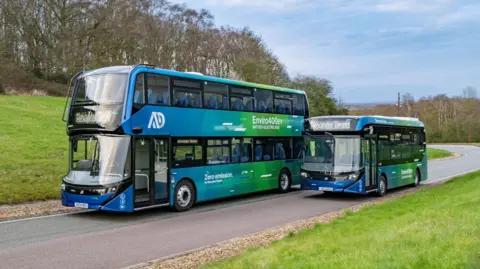Swinney 'deeply concerned' over bus firm job cuts
 Alexander Dennis
Alexander DennisThe first minister has said the Scottish government will do "everything it can" to support workers at bus manufacturer Alexander Dennis.
John Swinney said he was "deeply concerned" the firm was planning to move its full operation to a site in Scarborough, North Yorkshire, putting 400 jobs at factories in Falkirk and Larbert at risk.
However, he faced criticism from Scottish Labour leader Anas Sarwar, who claimed his government had ordered more buses from China than it had from the firm.
Swinney said most bus ordering decisions in Scotland were made by private operators, and the government had to comply with state subsidy rules in the way it supported businesses.
At First Minister's Questions Swinney said: "This issue has been occupying a great deal of the focus and the attention of the deputy first minister and I and the UK government ministers since we became aware of the situation over the last few weeks, and then ultimately to the decision that was announced yesterday."
He quoted a joint letter from the UK and Scottish governments, which pledged to "work closely with Alexander Dennis at this challenging time".
Alexander Dennis (ADL) cited strong competition from the China, which has seen its market share grow from 10% to 35%, among its reasons for the move.
The firm also criticised UK policy, and called for jobs and local economic benefit to be factored in when taxpayers money is invested.
Earlier Greater Manchester mayor Andy Burnham pointed to an order of 160 ADL buses for the publicly-owned "Bee Network" in the city, and questioned why the Scottish government could not do the same.
In a statement, Burnham - who has previously visited the Falkirk site - said: "Our iconic Bee Network buses are a bit of Scotland right here in Greater Manchester.
"We have over 160 Alexander Dennis buses criss-crossing our city-region every day - connecting our communities to opportunity.
"If Greater Manchester can invest in world-class Scottish bus manufacturing, then why can't the SNP Scottish government?"
Sarwar claimed the Scottish government had secured just 44 buses from ADL as part of the Scottish Zero Emission Bus Challenge Fund (ScotZEB) scheme last year.
The fund was initially established in 2022 to "disrupt the bus and coach market" and allow operators the chance to make the move to zero-emission vehicles.
 PA Media
PA MediaSarwar said that number was "five times" less than the number of buses ordered by Greater Manchester.
However, that figure only covered the second phase of the rollout.
The first phase, in which 276 buses were procured at a cost of about £62m, saw 137 buses ordered from ADL.
An additional 116 buses were ordered from Chinese manufacturer Yutong, while the rest were built in the UK, Ireland and Europe.
ScotZEBs predecessor, known as the Scottish Ultra-Low Emission Bus Scheme, also saw 207 electric buses ordered from ADL by operators between September 2020 and March 2021.
Swinney said state aid regulations - in the form of the UK-wide Subsidy Control Act - prevented the government from directly procuring from a single supplier.
In Scotland, most public service buses are procured by private operators, who then run them on routes across the country.
Swinney said: "What I am doing, what the deputy first minister is doing, is how can we find a way in which we can remain legally compliant with the Subsidy Control Act and enable these obstacles to be overcome?
"We are going to do everything we can to find a way through the Subsidy Control Act provision, so the government can continue to work within the law, and so we can support manufacturing in Scotland."
